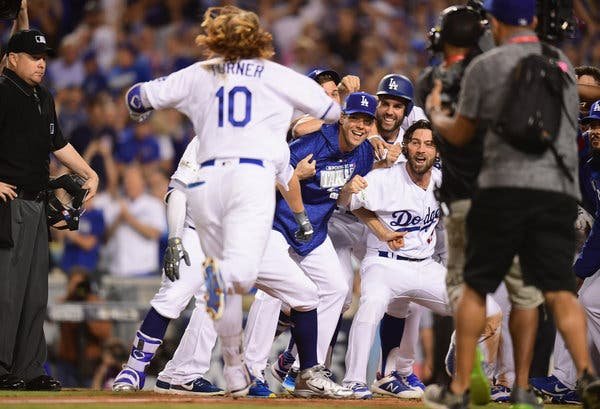A walk-off in baseball is an exciting event. It happens at the end of a game.
A team wins in their final at-bat, leaving no chance for the other team to respond. Baseball has many special terms, and “walk-off” is one of the most thrilling. Fans love it because it often ends the game in a dramatic fashion.
Imagine a player hitting a home run to win the game in the last inning. The crowd goes wild, and the player’s teammates rush to celebrate. This moment is called a walk-off. It’s a highlight that players dream about and fans eagerly anticipate. Understanding what a walk-off means can make watching baseball even more enjoyable. Let’s dive deeper into this exciting term and its significance in the game.
Introduction To Walk-offs
Baseball fans often hear the term “walk-off” in exciting games. But what does it mean? This section will explain walk-offs in baseball.
Definition
A walk-off happens when the home team scores the winning run in the bottom of the last inning. This ends the game immediately. The term “walk-off” is used because the losing team walks off the field. The winning team celebrates on the field.
Origin Of The Term
The term “walk-off” was first used in the late 20th century. Former pitcher Dennis Eckersley coined the phrase. He referred to home runs that ended games in favor of the home team. The term has since expanded to include any play that ends the game in the home team’s favor.
| Key Term | Definition |
|---|---|
| Walk-off | Winning run scored in the bottom of the last inning |
- Home team scores the winning run
- Game ends immediately
- Term coined by Dennis Eckersley
Walk-offs create thrilling moments in baseball. They symbolize a dramatic finish. This makes the game memorable for fans and players alike.
Historical Walk-off Moments
Baseball has a unique term called the walk-off. This term refers to a moment when the home team scores the winning run in the final inning. The game ends immediately after the run is scored. This creates a thrilling and unforgettable experience for fans. These moments are etched in the history of baseball. Let’s explore some historical walk-off moments.
Memorable Games
Certain games stand out because of their dramatic walk-off endings. Here are a few memorable ones:
- Game 6 of the 1975 World Series: Carlton Fisk hit a walk-off home run for the Boston Red Sox against the Cincinnati Reds. This moment is iconic and often replayed.
- Game 7 of the 1960 World Series: Bill Mazeroski’s walk-off home run for the Pittsburgh Pirates against the New York Yankees remains a classic.
- 1993 World Series: Joe Carter hit a walk-off home run for the Toronto Blue Jays against the Philadelphia Phillies. This secured the Blue Jays’ championship.
Famous Players
Some players are famous for their walk-off hits. They have made these moments special.
- David Ortiz: Known for many clutch hits, Ortiz had several walk-off home runs for the Boston Red Sox.
- Kirk Gibson: His walk-off home run in the 1988 World Series is legendary. Gibson did this while injured, adding to the drama.
- Derek Jeter: Jeter’s walk-off single in his final game at Yankee Stadium was a storybook ending to his career.
These players and games highlight the excitement of walk-off moments. They show the unpredictable and thrilling nature of baseball.
Mechanics Of A Walk-off
The mechanics of a walk-off in baseball can be thrilling. A walk-off occurs in the bottom of the last inning when the home team scores the winning run. This event ends the game immediately. Fans and players alike cherish these moments. Understanding the mechanics can add to the excitement.
Game Situations
Walk-offs happen in specific game situations. It usually takes place in close games. The home team must be tied or trailing by a small margin. These moments often build suspense. They keep everyone on the edge of their seats.
The pitcher must hold the lead or tie. The batter must deliver a hit or force a run. This combination creates the perfect storm for a walk-off.
Winning Conditions
Several conditions must be met for a walk-off to occur. The game must be in its final inning. The home team must have the last at-bat. The score must be tied or close.
The batter needs to reach base. They can do this through a hit, walk, or error. Runners on base increase the chances of scoring. A single, double, or even a home run can win the game.
Once the winning run scores, the game ends immediately. The crowd erupts. Players celebrate on the field. The mechanics of a walk-off create unforgettable moments in baseball.

Credit: en.as.com
Types Of Walk-offs
In baseball, a walk-off is a thrilling moment. It happens when the home team scores the winning run in the final inning, ending the game immediately. There are different ways this can happen. Let’s explore the types of walk-offs.
Home Runs
A walk-off home run is the most exciting type. The batter hits the ball over the outfield fence. This scores all runners on base, including the batter. The game ends instantly. Fans love this dramatic finish. Here is a quick breakdown:
| Situation | Result |
|---|---|
| Bases loaded | 4 runs scored |
| Runner on first | 2 runs scored |
| Solo home run | 1 run scored |
Base Hits
A walk-off base hit can be just as thrilling. The batter hits the ball into play. This allows a runner to score the winning run. The game ends as soon as the run crosses home plate. Various hits can cause this:
- Single: A hit that allows the batter to reach first base.
- Double: A hit that allows the batter to reach second base.
- Triple: A hit that allows the batter to reach third base.
Each type can lead to a walk-off. The key is the timing and the score. Fans often find these moments just as exciting as home runs. They create lasting memories.
Psychology Behind Walk-offs
A walk-off in baseball happens when the home team scores the winning run in the game’s final inning. This dramatic moment often leaves fans and players filled with intense emotions.
A walk-off in baseball is more than just a winning hit. It is a powerful moment. It affects both players and fans deeply. Understanding the psychology behind walk-offs can reveal why these moments are so impactful.
Player Mindset
Players face immense pressure during a walk-off scenario. The game rests on their shoulders. Their ability to focus becomes crucial. They must block out the noise and stay calm. Confidence plays a big role here. A player believing in their skills can make all the difference. Visualization also helps. Imagining success can boost a player’s chances.
Fan Reactions
Fans experience a whirlwind of emotions during a walk-off. The tension builds as the moment approaches. When the walk-off happens, the crowd explodes with joy. This shared experience creates a strong bond among fans. They feel connected to the team and each other. The excitement of a walk-off win often lingers. Fans talk about it for days, reliving the thrill. “`

Credit: www.reddit.com
Walk-offs In Playoffs
Walk-offs in playoffs take the excitement of baseball to another level. These moments often decide the fate of teams. The stakes are high. Fans hold their breath, waiting for the next big play. A walk-off can change everything in an instant.
High Stakes
In the playoffs, every game counts. A walk-off win means one team moves closer to the championship. The losing team faces elimination. The pressure builds with each pitch. Players know that one mistake can end their season.
The crowd’s energy is electric. Every fan feels the tension. A walk-off hit or home run brings relief and joy to one side. The other side feels heartbreak. The stakes are always high in these moments.
Legendary Moments
Some walk-offs become legendary. Fans remember these moments for years. One famous walk-off is Joe Carter’s home run in the 1993 World Series. His hit won the championship for the Toronto Blue Jays. Another example is Bill Mazeroski’s home run in the 1960 World Series. These moments are part of baseball history.
Walk-offs in playoffs create heroes. The players who deliver these hits are celebrated. Their names become well-known. These moments are replayed on highlight reels. They are talked about in sports discussions. Walk-offs in playoffs are unforgettable.
Impact On Teams
A walk-off in baseball can have a profound impact on teams. It can be a game-changer, shifting the momentum and altering the course of a season. The emotional high from a walk-off win can lift a team’s spirits, while a walk-off loss can be a tough blow. Let’s explore how a walk-off affects teams in different ways.
Momentum Shift
A walk-off win often leads to a significant momentum shift. The team’s energy spikes, and morale boosts. This can translate into better performance in upcoming games. Players feel more connected and motivated.
For the losing team, it can be disheartening. They might experience a dip in morale. Overcoming a walk-off loss can be challenging. But it also presents an opportunity for growth and resilience.
Season Implications
A walk-off can have serious season implications. It can be the difference between making the playoffs or not. Teams often remember these pivotal moments.
Consider this scenario:
- A team wins a walk-off game in a crucial series.
- This win boosts their standings.
- They carry this momentum forward.
The opposite can also happen. A walk-off loss might push a team down the standings. They might struggle to recover.
| Positive Impact | Negative Impact |
|---|---|
| Boosts team morale | Decreases team morale |
| Improves performance | Can lead to a slump |
| Enhances team unity | Challenges team resilience |
In conclusion, the impact of a walk-off extends beyond a single game. It can shape a team’s entire season, influencing their success or struggles.
Controversial Walk-offs
Walk-offs in baseball are thrilling. They bring excitement and drama to the game. But not all walk-offs are straightforward. Some end with controversy. These disputes often arise from umpire decisions and rule interpretations. Let’s delve into some of these controversial moments.
Umpire Decisions
Umpires have a tough job. Their calls can make or break a game. A walk-off win is particularly sensitive. One wrong call can spark outrage. Fans and players react strongly to such decisions. Umpire decisions during walk-offs often face intense scrutiny.
Consider a disputed strike zone. A pitch that seems outside but is called a strike can end a game. This leaves the losing team feeling cheated. Another common issue is a close play at home plate. Was the runner safe or out? These decisions can be highly controversial.
Rule Interpretations
Baseball rules can be complex. Sometimes, they leave room for interpretation. During walk-offs, these interpretations come under the spotlight. Misunderstandings or misapplications of rules can lead to heated debates.
One example is the infield fly rule. If not clearly understood, it can cause chaos. Players may not know whether to run or stay. This confusion can decide the game’s outcome. Another tricky rule is interference. Was there obstruction by a fielder or a baserunner? Such calls are often controversial and can lead to walk-off wins or losses.
Here is a table summarizing some common controversial situations:
| Situation | Possible Controversy |
|---|---|
| Strike Zone | Disputed pitch calls |
| Close Play at Home | Safe or out |
| Infield Fly Rule | Confusion about running |
| Interference | Obstruction calls |
These controversial moments add drama to baseball. They keep fans talking long after the game ends. Whether you agree with the calls or not, they are a part of the sport’s rich history.
Training For Walk-off Scenarios
Training for walk-off scenarios is essential for any baseball team. A walk-off win is one of the most thrilling moments in sports. This intense situation demands the players to stay calm and deliver under pressure. To prepare for such moments, teams engage in specific practice drills and adopt effective coaching strategies.
Practice Drills
Effective practice drills can help players handle walk-off scenarios. Here are some drills to consider:
- Simulated Game Situations: Coaches set up scenarios that mimic actual game conditions. Players learn to react and make decisions quickly.
- Pressure Batting Practice: Batters take swings while imagining the game is on the line. This helps them get used to the pressure.
- Base Running Drills: Players practice running bases with a focus on scoring the winning run. They learn to take quick and smart decisions.
- Defensive Drills: Fielders practice making crucial plays to stop the opposing team from scoring. This enhances their reflexes and decision-making skills.
Coaching Strategies
Coaches play a pivotal role in preparing players for walk-off moments. Here are some effective strategies:
- Scenario Planning: Coaches discuss various game situations with players. They plan how to respond to each scenario.
- Mental Conditioning: Coaches teach players how to stay calm and focused under pressure. Techniques like visualization and breathing exercises are useful.
- Team Communication: Clear communication between coaches and players is crucial. This ensures everyone knows their role and responsibilities.
- Game Analytics: Analyzing past walk-off scenarios helps in understanding what worked and what didn’t. Coaches use this data to improve future performances.
By incorporating these drills and strategies, teams can enhance their chances of succeeding in walk-off scenarios. Training for such moments ensures that players are prepared, confident, and ready to deliver when it matters the most.

Credit: www.reddit.com
Frequently Asked Questions
What Is A Walk-off In Baseball?
A walk-off in baseball happens when the home team scores the winning run in the last inning. The game ends immediately after the run is scored, leaving the opposing team no chance to respond.
How Does A Walk-off Home Run Work?
A walk-off home run occurs when a batter hits a home run that scores the winning run in the final inning. This instantly ends the game in favor of the home team.
Why Is It Called A Walk-off?
It is called a walk-off because the opposing team walks off the field right after the winning run is scored. The game concludes immediately, hence the term “walk-off. “
When Can A Walk-off Occur In Baseball?
A walk-off can only occur in the bottom half of the final inning. This is because it needs to be the last opportunity for the home team to score the winning run.
Conclusion
A walk-off in baseball is a thrilling moment. It ends the game instantly. Fans love the excitement it brings. Players dream of making that winning hit. Understanding this term adds to your enjoyment of baseball. Now, you can join the conversation with confidence.
Next time you watch a game, you’ll know exactly what a walk-off means. Enjoy the game and cheer for those dramatic finishes!





